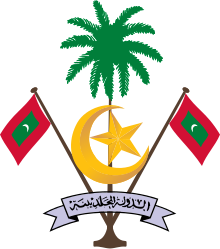| ދާޚިލީ ސަލާމަތާއި ފަންނިއްޔާތާ ބެހޭ ވުޒާރާ Dhakhilee Salaamathaai Fanniyaata Behey Vuzaara | |
 | |
| Agency overview | |
|---|---|
| Formed | December 22, 1932 |
| Jurisdiction | Government of the Maldives |
| Headquarters | Velaanaage |
| Annual budget | MVR 68.2 million (2024) [1] |
| Minister responsible | |
| Deputy Ministers responsible |
|
| Agency executives |
|
| Child agencies |
|
| Website | mohst.gov.mv |
The Ministry of Homeland Security & Technology, formerly known as the Ministry of Home Affairs is part of the Maldivian Executive branch responsible for maintaining law and order in the Maldives at the national level. It was introduced in 1932 after the Maldivian independence under president Ibrahim Nasir, the second president of Maldives.












